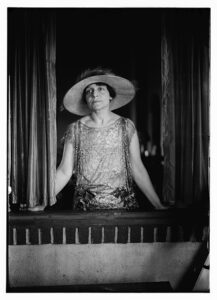Courtesy of Wikipedia

Estelle Liebling (April 21, 1880 – September 25, 1970) was an American soprano, composer, arranger, music editor, and celebrated voice teacher and vocal coach.
Born into the Liebling family of musicians, she began her professional opera career in Dresden as a leading coloratura soprano in 1898 when she was just 18 years old. She sang with several important opera houses in Europe, including the Opéra-Comique, the Semperoper, and the Staatsoper Stuttgart. From 1902 to 1904 she was committed to the Metropolitan Opera, and from 1902 to 1905 she toured internationally in more than 1,600 concerts with John Philip Sousa and his band. After her marriage in 1906, she performed only occasionally in the succeeding two decades.
Liebling began her teaching career in the 1910s, not stopping until her death more than 50 years later. Her pedagogy was rooted in the tradition of her teacher Mathilde Marchesi. She mainly taught out of her private studio in New York City, with the exception of three years working on the faculty of the Curtis Institute of Music in the 1930s. During her career she was the vocal coach or voice teacher of 78 principal singers at the Met.
Many of her students were famous singers and entertainers or other public figures, including sopranos Beverly Sills, Amelita Galli-Curci, Maria Jeritza, Kitty Carlisle, and Margaret Truman; baritones Titta Ruffo and Alexander Sved; Wagnerian tenor Max Lorenz; dancer Adele Astaire; actresses Joan Crawford, Gertrude Lawrence, and Meryl Streep; socialite Irene Mayer Selznick; and Hollywood gossip queen Louella Parsons.
Liebling composed, edited, and arranged music for singers, most often for coloratura sopranos, but also for other voices. A prolific arranger and editor of vocal music for the music publisher G. Schirmer, Inc. and the author of several influential vocal pedagogy texts, she is considered one of the most influential voice instructors and vocal pedagogy authors of the 20th century.
In particular, her influence on the interpretation of coloratura soprano repertoire has had a lasting impact, with musicologist Sean M. Parr stating that Liebling “codified many traditional coloratura cadenzas.”
To read the rest of the Wikipedia article, click here.
Tomorrow, April 22: Commodore Uriah Levy